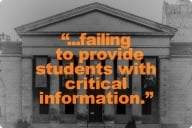You have /5 articles left.
Sign up for a free account or log in.
WASHINGTON -- Some student loan borrowers have reported to federal consumer protection officials that their private lenders automatically placed them in default when their cosigner died or filed for bankruptcy, even when the borrowers were otherwise paying the loan on time.
The Consumer Financial Protection Bureau highlighted that issue on Wednesday in a report analyzing the more than 2,300 complaints it had received about private student loan companies from the beginning of last October through the end of March. (The volume of complaints was up by more than one-third compared to the same period last year).
The issue is that some private student loans contain terms allowing lenders to demand the full outstanding amount of a loan when a borrower’s cosigner -- often a parent or grandparent -- dies or files for bankruptcy protection, according to Rohit Chopra, the CFPB’s student loan ombudsman who authored the report.
In some cases, Chopra said in a call with reporters, lenders have automatically placed a borrower in default upon the death or bankruptcy of the cosigner, without giving the borrower the opportunity to pay the full outstanding amount.
The report says that the CFPB “routinely” receives complaints about cosigner problems on private student loans, but Chopra conceded that officials do not know the prevalence of the problems.
Chopra told reporters that the goal of putting out the report and advisory was so that private lenders “might review these policies and consider alternatives.”
Still, he said, “most of the larger players in this industry do have contracts that contain these options,” which he described as “auto-defaults.” The financial industry uses the term “accelerate” the payments of the loan.
Cosigners are an increasingly prevalent feature of private student loans. In 2011, about 90 percent of private student loans had a cosigner, up from 68 percent in 2008, according to the CFPB. Even when lenders do not require a borrower to have a cosigner, having one can lower the borrower’s interest rate.
The vast majority of student loans made directly by the federal government do not require a cosigner. Some federal PLUS loans may require an endorser for borrowers not meeting minimum credit standards. However, those loans do not have similar terms allowing the government to demand the full balance of those loans when the endorser dies or files for bankruptcy.
Requests for comment made Tuesday to the two largest private student lenders -- Sallie Mae and Wells Fargo & Co. -- were not returned.
Guidance on Releasing A Cosigner
CFPB officials also said that borrowers reported problems in seeking to assume total responsibility for the loan and ending reliance on a cosigner, noting in a consumer advisory that “many student loan servicers do not tell you when you are eligible to have your cosigner released.” Lenders allow some borrowers who lacked the credit history to obtain a loan without a cosigner to subsequently show that they don't need one. But, CFPB officials said, that process can be murky for borrowers.
"Lenders should have clear and accessible processing in place to enable borrowers to release cosigners from loans,” CFPB Director Richard Cordray said in a statement. “A borrower should not have to go through an obstacle course.”
The bureau released sample letters that can be sent to loan servicers, requesting that a lender release a cosigner from a loan.








